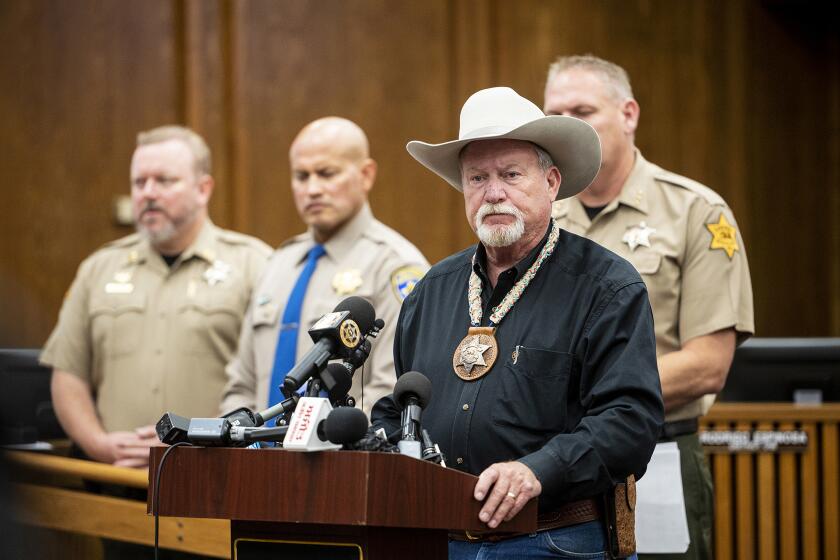Shelter for Mentally Ill Operates With Few Rules, Little Oversight
They may be cluttered and less than pristine, but Darryl Cannady considers his two boardinghouses in Echo Park a last-chance refuge for mentally ill patients who would otherwise be on the streets.
Los Angeles County mental health officials have described the conditions in court documents as “horrible and illegal,” citing filthy mattresses and bathrooms, overcrowding and medications stored “randomly” in the open. They liken Cannady’s two houses to one in the San Gabriel Valley that aroused concern because five of its residents died this year.
But no one has died at Cannady’s houses--both known as Dad’s House--and they remain open, providing sorely needed shelter to vulnerable occupants.
The problem, county and state officials say, is that such facilities exist in a regulatory netherworld, subject to few rules and little oversight. That can lead to abuses that are difficult to detect unless there is a complaint, and by then, it may be too late.
Facilities that provide care and supervision to residents are required to be licensed by the state, but many unlicensed boardinghouses provide these services illegally--including disbursing Social Security checks and coordinating medical care. No one knows the precise number or locations of such unlicensed facilities in Los Angeles County.
The California Department of Social Services cited Dad’s in May for providing illegal care and later fined the operator $4,000. But the houses remain in operation while Cannady’s attorney contests the fine.
Cannady argues that he operates the equivalent of an apartment building, which does not require licensure.
“It’s a tricky deal,” said John Gordon, a spokesman for the state Department of Social Services. “When we find someone that’s unlicensed, we don’t have a lot of jurisdiction.... We don’t have the authority to shut them down.”
In essence, Gordon said, authorities depend on operators to be honest about the type of services they provide and to seek a license if one is required. His agency also depends on mental health officials to monitor where psychiatric hospitals refer their patients upon discharge.
“We’re really focused on the facilities that we do license and making sure that they fall within the regulations,” he said. “However, when we have these [unlicensed] situations, we try to get them resolved.”
Deaths at One Facility
Regulators have struggled with how to handle unlicensed board-and-care facilities for years, but the debate gained urgency after five residents of one San Gabriel house died this year.
The most severe penalty to arise from the deaths, however, targeted not the San Gabriel house, but two of the psychiatric hospitals that referred patients there. The county Department of Mental Health stripped the hospitals of the authority to detain mentally ill patients against their will.
In court papers, the county also cited the hospitals’ referrals to Dad’s as justification for its action.
Hollywood Community Hospital of Van Nuys, where Cannady works as a chef, and City of Angels Medical Center-Ingleside have sued to have the sanctions overturned. Los Angeles Superior Court Judge David Yaffe upheld the sanctions Friday.
Meanwhile, county and state authorities try to keep an eye on Dad’s.
During an April visit to one of the houses, on Clinton Street, inspectors found an open container of malt liquor on the kitchen table. Dad’s has billed itself as a sober-living house, but Cannady now says it is for “independent living.”
On a return trip in June, inspectors described “deplorable conditions”: clothing and medications strewn all over the floors; furniture broken and torn; tarps covering the windows, and numerous holes in the wall, according to a court affidavit filed by Barbara Leifer, a patients rights advocate with the county Department of Mental Health.
“There needs to be a better system,” Leifer said in an interview. “There needs to be a system where people do get in trouble--there are punishments, there are repercussions.”
Regulators can--and have--removed seriously ill patients from unlicensed facilities and placed them in houses licensed to give them the care and supervision that they need.
But sometimes patients return to the unlicensed boardinghouses, and regulators are nearly powerless to stop them.
It’s all the harder to intervene because conditions can change dramatically from day to day, as can the health of residents, officials said.
On Aug. 30, for instance, Cannady invited a reporter to visit his two houses. The furniture and carpets were soiled, and a broken-down car and appliances sat in the front yard.
But no medications were strewn on the floor, and no liquor was on the table. Mental health officials, who showed up during the reporter’s visit, confirmed that conditions appeared better than inspectors described in April and June.
“It’s not a great place to live, but that’s where the clients want to live, and they have a right to live there,” Leifer said. “As of today, at least what they showed us, it’s probably a legally run facility.”
“Maybe it’s because they’re on notice now,” added Leifer’s boss, Carole Mathews. “They know people are going out there” to inspect.
Last Tuesday, Leifer and Mathews returned to Dad’s for an unannounced visit and found the place dirtier. Clothes were on the floor, and dirty pots were on the stove, they said. But they said they did not find any residents needing care or supervision.
On Friday, on a return visit, county and state officials were not allowed on the premises, Mathews said. Instead, residents were allowed to come outside the front gate to talk to them.
“It’s not like we have the authority to say, ‘We’re the Department of Social Services, let us in,’ ” Gordon said. “It’s just another obstacle that we have to overcome.”
Cannady calls the visits “constant harassment.” He said his residents are seeking legal aid to pursue redress.
Helping Former Addicts
Cannady said he became interested in helping mentally ill patients a few years ago when a colleague told him about the squalid conditions at “sober-living” facilities that housed recovering addicts.
“We looked around and talked to different people and decided we’ll take the people that nobody else wants to take and give them dignity,” he said.
Cannady maintains that his houses provide an independent living environment, whose rules are created by residents, not him. He said state laws don’t permit him to enter residents’ bedrooms to see whether they are clean.
He also said he makes little to no money from the houses, despite charging $475 per month for rent and one meal a day.
“There’s no money being made,” he said. “I am so broke.... I owe everybody just making sure these guys have a place to stay.”
Soon, he plans to close the house on Clinton Street and move residents to another facility nearby if they choose.
Ten residents from both Dad’s houses told a reporter they had been in and out of psychiatric hospitals, and some had been homeless before coming to live at Dad’s. They say Cannady is helping them.
“I was tired of living on the street, so I came here, and I like living here,” said Fred McQuiston, 55, who says he is a paranoid schizophrenic who also suffers from bipolar disorder. “I’ve got no bits about living here. Everything’s hunky with me.”
McQuiston said that a doctor comes once in a while to check in on residents, and Cannady helps him with his budget. But he said he remembers to take his medications on his own, and doesn’t need help to get by.
The California Assn. of Addiction Recovery Resources, which represents sober-living homes, said some unlicensed places pose a credibility problem for the industry as a whole. The group offers a voluntary registration process, in which facilities agree to be inspected by the association.
“The true sober-living home is a landlord-tenant agreement where a person is renting a room or renting space with the assumption that there will be no alcohol or drugs,” said Susan Blacksher, the group’s executive director. “Our picture of a sober-living is the nicest home on the street, and it’s clean and respectable.”
Legislative Efforts
State Assembly member Judy Chu (D-Monterey Park) introduced a bill this year to require adult recovery (also known as sober-living) facilities to obtain licenses from the state. She said courts and hospitals are currently referring patients to facilities that they know little about.
Her bill died in the Legislature, primarily because the state lacked money to implement the system she proposed.
“We heard that there were unscrupulous operators out there and no oversight,” Chu said. “We want the courts and hospitals to refer them to homes that they know are in good operation and are legitimate.”
More to Read
Start your day right
Sign up for Essential California for news, features and recommendations from the L.A. Times and beyond in your inbox six days a week.
You may occasionally receive promotional content from the Los Angeles Times.






